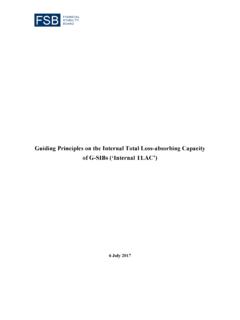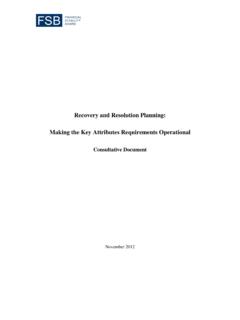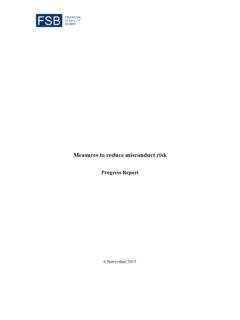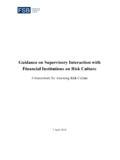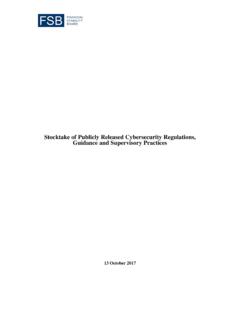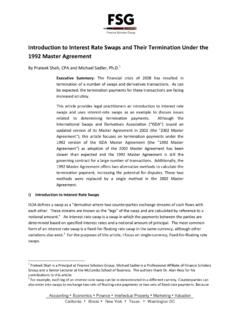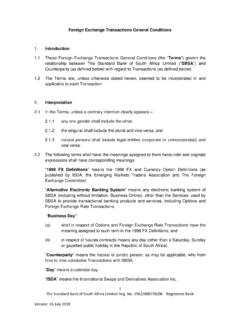Transcription of Principles for Cross-border Effectiveness of …
1 Principles for Cross-border Effectiveness of Resolution Actions 3 November 2015. ii Table of Contents Overview .. 5. Statutory approaches .. 5. Contractual recognition .. 6. Temporary stays on early termination 7. Bail-in .7. Official action to promote widespread adoption of contractual recognition .. 8. Adoption of statutory recognition frameworks over time .. 8. Principles for Cross-border Effectiveness of Resolution Actions .. 11. Statutory Measures .. 11. Contractual Measures .. 13. Annex I .. 18. Annex 20. iii iv Overview At the St. Petersburg G20 Summit in 2013 the FSB made a commitment to develop policy proposals on how legal certainty in Cross-border resolution can be further enhanced.
2 1 These Principles set out statutory and contractual mechanisms that jurisdictions should consider including in their legal frameworks to give Cross-border effect to resolution actions in accordance with the Key Attributes. 2 The Principles are not intended to be comprehensive, and each jurisdiction will need to consider what is required in the context of its own legal environment for such a legal framework to be effective. While emphasising the importance of implementing comprehensive statutory frameworks, these Principles also support contractual approaches to Cross-border recognition, which the FSB agreed were critical pending the adoption of such statutory frameworks and which may also complement such regimes once they are in place.
3 This guidance has been developed with a focus on the resolution of banks. However, many of the legal issues and Principles that are discussed below may be relevant to other types of financial institutions as well as to financial market infrastructures. In order to enhance the Effectiveness of Cross-border resolution, the Key Attributes require jurisdictions to provide for transparent and expedited processes to enable resolution measures taken by a foreign resolution authority to have Cross-border effect provided that domestic creditors are treated equitably in the foreign resolution proceedings (KA ).
4 The need to give Cross-border effect to resolution actions may arise with respect to a firm undergoing resolution in its home jurisdiction that operates a branch or controls a subsidiary in a foreign jurisdiction; or a firm that holds assets, liabilities or contracts located or booked in, or subject to the law of, another jurisdiction in which the firm is not established. Statutory approaches Statutory approaches for giving effect to foreign resolution measures in a manner consistent with KA , with due regard to the Safeguards in KA 5, may take the form of; (i) a recognition process; or (ii) the taking of measures under the domestic legal framework that support and are consistent with the resolution measures taken by the foreign home resolution authority.
5 Recognition. Recognition implies that, at the request of a foreign party, a jurisdiction would accept the commencement of a foreign resolution proceeding domestically and thereby empower the relevant domestic authority (either a court or an administrative agency 3) to enforce the foreign resolution measure or grant other forms of domestic 1 Specifically, the FSB made a commitment to develop policy proposals on how legal certainty in Cross-border resolution can be further enhanced, such as by inclusion in debt instruments of clauses that recognise the effect of resolution actions taken in another jurisdiction and develop proposals for contractual or statutory approaches to prevent large-scale early termination of financial contracts.
6 The FSB Report to the G20 on Progress and Next Steps towards Ending Too-Big- To-Fail (TBTF) identified legal uncertainties about the Cross-border Effectiveness of resolution measures as one of the main obstacles to the resolution of systemically important financial institutions (SIFIs) that operate across borders. 2. A consultative version of these Principles was issued in September 2014. See 3. The Key Attributes generally require that jurisdictions confer resolution powers on an administrative authority but allow for judicial involvement in resolution. The Key Attributes indicate that to the extent that the resolution planning process contemplates that judicial action may be necessary it should ensure that the time required for court proceedings will not 5.
7 Relief, for example, a stay on domestic creditor proceedings. Recognition is not dependent on the exercise of resolution powers in the local jurisdiction. Once recognition is granted, the measures adopted by the foreign home authority can be given effect in accordance with the law of the domestic jurisdiction even if there are no grounds for the commencement of domestic resolution proceedings. Recognition generally does not extend to the application of provisions of foreign law that are inconsistent with the domestic framework. Supportive measures. Supportive measures involve the taking of resolution (or other).
8 Measures by the relevant domestic authorities, in the context of domestic resolution proceedings or supervisory action, to produce the effect of, or otherwise support, the resolution action taken by the foreign resolution authority. In this regard, the relevant domestic authority may act at the request of the foreign resolution authority or independently take resolution or other actions that are consistent with the foreign measures. However, its ability to take such action may be conditional on the commencement of domestic resolution proceedings and the resolution authority would be limited to the measures that are available under the domestic regime.
9 Differences between the resolution powers available in the home and host jurisdictions could therefore give rise to inconsistencies between the outcome desired by the foreign home authority and the outcome the host authority would be able to achieve. Such inconsistency could be minimised if both home and host jurisdictions implement regimes that are consistent with the Key Attributes or adopt resolution strategies that take into account the differences in resolution powers. Early coordination among relevant jurisdictions through institution-specific cooperation agreements and MOUs can facilitate a process that relies on supportive measures.
10 Recognition and supportive measures complement each other and in some cases both may be required to achieve the desired outcome. Legal and procedural differences may mean that a recognition process is more suitable for certain resolution actions or certain situations, while supportive measures may be the preferred approach for others. Existing Cross-border cooperation and recognition frameworks adopt a combination of approaches. See Annex I for examples of existing frameworks. Contractual recognition Contractual recognition approaches can help support the Cross-border enforceability of resolution action.
